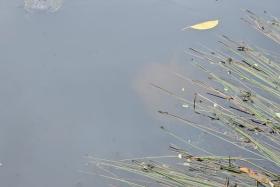Eight-storey fish farm, built at cost of $65m, to be sold
Two companies have conditionally agreed to purchase beleaguered Apollo Aquaculture Group’s eight-storey fish farm in Lim Chu Kang, more than two years after the company ran into financial difficulties.
The $65 million multi-storey fish farming facility, owned by the group’s subsidiary Apollo Aquarium, has been conditionally sold to local construction and engineering firm HPC Builders and Aquachamp, an investment holding company which has subsidiaries in the fish farming industry.
The acquisition is subject to approval from the Singapore Food Agency (SFA) among other conditions. SFA declined to respond to ST’s request for comment.
The facility, one of Singapore’s tallest fish farms, began operations in 2021, where it was showcased as a high-tech farming solution that addressed the Republic’s land-scarcity constraints.
However, it has been lying dormant since its parent company, Apollo Aquaculture Group ran into financial difficulties and was placed under judicial management in May 2022.
In early 2023, Apollo Aquarium ceased operations.
Judicial management refers to a form of debt restructuring which aims to prevent viable companies in financial difficulties from being liquidated.
In judicial management, an independent judicial manager is appointed to manage the affairs, business, and property of a company under financial distress.
Apollo Aquaculture Group has a total of five subsidiary companies.
They include: Apollo Aquarium; water technology firm Cube 2; Aquaworld Tropical Fish, a company involved in the ornamental fish industry; Smart Hatchery, which operates fish hatcheries, and Apollo Marine Seafood, which is involved in the retail sale of meat, poultry, eggs and seafood.
Of the five, only Apollo Aquarium is still live, while the other four companies have already entered into liquidation.
Apollo Aquaculture Group’s judicial manager, Deloitte Singapore’s strategy, risks and transactions partner Tan Wei Cheong, said that the company’s financial challenges resulted largely from delays in the completion of the aquaculture property of its subsidiary, Apollo Aquarium.
The delays had resulted in escalating costs and in turn affected the group’s revenue and operations, he added. The group is divesting its stake in Apollo Aquarium as part of its restructuring.
He said he was unable to comment further on the sale and purchase agreement as it is still being finalised.
According to media reports in 2021, the company aimed to start farming hybrid grouper and coral trout at the first three storeys of its Lim Chu Kang facility, with an expected output of up to 1,000 tonnes of fish a year from 2021, before scaling up to 2,700 tonnes by 2023.
However, the company’s operations ceased in early 2023. Had it hit its target output, it would have significantly added to the 4,100 tonnes of seafood Singapore produced in 2023.
According to a filing on the Hong Kong Stock Exchange on May 31, seen by The Straits Times, HPC Builders will purchase 70 per cent of Apollo Aquarium’s equity, for not more than $3.5 million, while the remaining 30 per cent will be sold to Aquachamp. HPC Builders’ parent company, HPC Holdings, is listed on the Hong Kong Stock Exchange.
As at March 31, the book value of the farm - including its equipment and machinery, is worth $44 million.
The multi-storey fish farm is said to be Apollo Aquarium’s “only significant asset”, according to the document.
The three entities had entered into an agreement for HPC and Aquachamp to acquire Apollo Aquarium on May 31.
The sale will essentially allow HPC Holdings to invest in Singapore’s aquaculture industry at a “low cost”, according to the document.
Aquachamp, which is an “experienced fish farm operator”, according to the bourse filing, will be in charge of the management and operations of the fish farm. ST has contacted the company for comment.
HPC Holdings said that the investment was done at a “bargain price”, and the fish farm will be able to “run at full production capacity, yielding favourable returns in the long run, with a stable sales income and a broadened revenue base”.
Checks by ST found that Aquachamp’s registered address is in the same location as an ornamental fish farm known as Max Koi Farm, situated close to the Apollo facility in Lim Chu Kang.
Acra records show that Max Koi Farm is owned by Mr Ng Chuen Guan, who is also a director of Aquachamp, and a director of Apollo Aquaculture Group, which he owns close to 2.9 million shares in.
Apollo Aquaculture Group’s two largest shareholders are Ng Yong Hock Capital, which holds around 55.1 per cent of the company’s shares, and TLS Beta, which holds about 33.1 per cent of the shares, equivalent to $35 million of paid-up capital.
TLS Beta is a wholly-owned subsidiary of Temasek Life Sciences, a beneficiary of Temasek. Temasek declined to respond to queries from ST.
The remaining equity is owned by three companies and 14 people, with each of their equity stake ranging from approximately 0.1 per cent to 3.6 per cent, according to the document.
The group’s subsidiary, Apollo Aquarium, is primarily involved in fish farming activities and the import and export of freshwater ornamental fishes.
According to the filing by HPC Holdings, as at March 31, Apollo Aquarium’s unaudited debt stood at about $35.4 million.
Cargill TSF Asia, the financial services arm of the agricultural commodity giant, was listed as one of Apollo Aquaculture Group’s creditors, according to Acra. ST has approached Cargill for comment.
Get The New Paper on your phone with the free TNP app. Download from the Apple App Store or Google Play Store now

